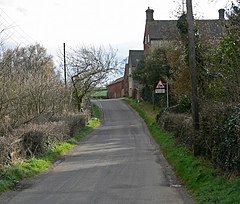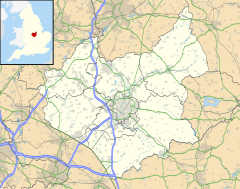Appleby Parva
| Appleby Parva | |
|---|---|
 Austrey Lane and Westhill Farm |
|
| Appleby Parva shown within Leicestershire | |
| OS grid reference | SK 31443 09675 |
| • London | 163 km |
| Civil parish |
|
| District | |
| Shire county | |
| Region | |
| Country | England |
| Sovereign state | United Kingdom |
| Post town | SWADLINCOTE |
| Postcode district | DE12 |
| Dialling code | 01530 |
| Police | Leicestershire |
| Fire | Leicestershire |
| Ambulance | East Midlands |
| EU Parliament | East Midlands |
| UK Parliament |
|
Appleby Parva, or Little Appleby (Known locally as Over-Town), part of the parish of Appleby Magna in Leicestershire, is a hamlet about 1 mile (1.6 km) south-west of Appleby church. It straddles the A444, south of the crossroads of the highways from Ashby de la Zouch to Tamworth, from Atherstone to Burton upon Trent and Junction 11 of the M42/A42. Appleby Magna and Appleby Parva are usually collectively known as Appleby.
The village was also calculated to be the centre of population of Great Britain in 2000, according to research by Professor Danny Dorling.
Appleby Parva is originally believed to be a Danish settlement, whilst Appleby Magna is believed to be an earlier settlement pre-dating the Anglo-Saxons. The name is derived from a combination of 'apa', meaning water or stream, and 'by(r)', meaning settlement.
Appleby appears 3 times in the Domesday Book, with Appleby Magna (listed as Aplebi and Apleby) and Appleby Parva (listed as Apleberie) recorded separately.Appleby Magna is listed as partly in Derbyshire and partly in Leicestershire, where Appleby Parva is listed as being in Leicestershire Both have shifted across the borders several times but have been part of Leicestershire since 1897.
Appleby Parva is listed in the Doomsday Book as under the lordship of Robert de Ferrers, 1st Earl of Derby, who held it under his father Henry de Ferrers, a French Nobleman and companion of [{William I]]. The Hamlet is valued at £0.5, with a taxable value of 1 Geld Unit, and a population of 4 households and 4 freeman. The hamlet is thought to have been relatively undeveloped until prior to the Norman Invasion of 1066; the land sits at the bottom of a hill and is poorly drained, so was not cultivated by the Saxons or Danes: the settlement only began to properly develop under its new French Lord, post-1066. There is thought to have been some local ethnic divide, with Appleby Magna (owned by Burton Abbey and Lady Godiva) inhabited by primarily Anglo-Saxon villagers, and Appleby Parva inhabited by a small group of Normans.
...
Wikipedia

